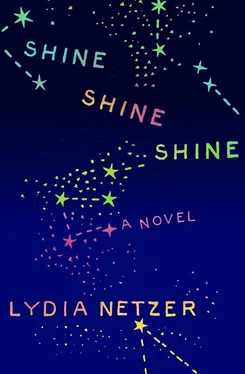“Incorrect,” said Maxon, following him. “Hera laughs. It’s what makes Hera so reliable.”
“I don’t believe in it,” said Phillips. “It’s pointless. A robot that laughs. What the hell?”
When he was strapped into his seat, Phillips said, “Go ahead, Houston. Aeneid rocket is ready to run the sim. All crew present.”
Maxon was familiar with the language of naysayers. They were afraid. Sometimes their faces showed that, the same thing as confusion, with the eyebrows down and chin raised. When Hera’s software was first coded, some people said it was a kind of abomination. Other people said it was a gimmick. They were interested in torque and tensile strength, in the size of robots and what they were composed of. An article in the International Journal of Robotics Research called him “a gearshrinker,” with scorn. He didn’t read the article, because he had determined from the title that he wouldn’t like it. For Maxon it was not a question of good or bad, or even why, but just a question of what’s next, and then ultimately, not even a question, but just a history. A history of humanity, in all the ways they were alive.
Then there was the Juno model, who experienced a similar jostling of gears and clenching of hydraulics when she was left alone, away from other Juno models, for a specified amount of time. Juno’s crying was a lot like Hera’s laughing, except there was no viral spread. Her visual sensors became impaired and had to be cleared, by her or another Juno who was moved to participate, or not, by her own if/then clauses. An article in Wired magazine called “The Lonely Robot” had described one Juno meeting another, and how they shook when they were separated. This was before the Juno code was wired into a construction frame, made so rectangular. Magazines are only interested in the humanoid functions of humanoid robots. Make them look like bulldozers and you can get away with anything.
What didn’t matter much to Maxon was the shape the robots took externally. How to put a microscope in them. How to make them smaller, bigger, work in the human bloodstream, simplify bipedal mobility. He had an abundance of research assistants to task with these technical details. His job was coding, thinking, more coding, and the completion of lists. He moved through his labs back at Langley like a wraith, stained hair falling down around jagged cheekbones, hands dangling at the end of his long arms, spine convex. He rode his bicycle for hours, working out command sequences on the pavement in front of him, every square meter like an open stretch of whiteboard, there and then erased.
“Houston, we are go for this procedure,” said George Gompers, mission commander. “Standing by.”
Their screens wavered, and instead of the clear view of space they all saw a holographic projection, where the moon loomed large and they could see the cargo module, containing all the robots they would be taking down to the lunar surface. Their job, in orbit, was to dock with this cargo, extract the three containers, and then convert the command module into the lunar lander. While the pilot, the engineer, and the commander repeated orders, fired small rockets, repositioned, and aligned the rocket for the simulated docking, Maxon looked at his cargo module full of robots.
He wondered what they were doing in there, what they were dreaming.
All of Maxon’s robots, like Maxon, could dream. A randomly generated string of code gently stimulated the processors during their mandatory off modes, testing the chemobionic reactions while the official electronic pathways were shut down. It hadn’t even been hard, shattering this particular old ax. It had come apart like a clay pot. The robots remembered the events of their lives, the data they had recorded. In dreams, they transposed numbers, brought sets adjacent that were never meant to be interpreted together, and when they “woke up” they often had new “ideas” in the form of patterns and connections read in the chaos of their jumbled sleep.
The more like a human the better, whether the bot was as small as a fragment of nanotech cleaving the valves of the heart or as big as a sentient harbor crane. Humans work. They are an evolutionary success. The more they evolve, the more successful they become. Maxon had once thought that at this moment, when he was ready to land on the moon, his list of things that robots couldn’t do would have had every entry crossed out in a dark line. He had planned that the phrase “quintessentially human” would have been obviated by now. Indifferent to all protest, he had relentlessly made dreaming, faceless, laughing robots that were inexorably closing in on humanity.
The AI was startling. People had to admit. Maxon’s robots did what other robots could not do, thought what other robots could not think. That was the reason he held so many patents, and had such an astonishing bank account at such a young age. But the most important thing, the reason he was employed by NASA and on his way to the moon: Maxon’s robots could make other robots. Not just construct them, but actually conceive of them, and make them.
To create a moon colony, a lot of robots are needed. Robots to build the station, robots to run it, robots who don’t mind breathing moon atmosphere, who don’t mind moon temperatures, robots to take care of human visitors. The moon colony proposed would belong to the robots for many years to come; this was understood. Humans would be their guests. The problem was that no one could shoot a robot big enough to construct a moon colony up to the moon. There just wasn’t enough room in a rocket for diggers, cranes, stamping presses.
So the answer was to shoot up a robot that could make another robot big enough. Juno and Hera were the robot mothers: steely, gangly, whirring, spinning mothers, built to mine the materials and fabricate the real robots, the real builders, who would re-create the world on the moon. Only a laughing, crying, dreaming robot could be a mother. An awful thought, for some. A perversity—but this was the reason for everyone else’s failure. All this business of a human purview. As if it weren’t all electricity, in the end. Maxon couldn’t remember ever thinking that something a robot did was awful.
Maxon watched the simulated docking procedure, watched the holographic cargo module getting closer, the engineer and pilot arguing over angles and coefficients. He uncapped his pen and wrote in his notebook: “You are a weak, sick man, and your frailty in the darkness of space is a vile embarrassment to your species.” Remember this, he thought. But did he really believe it? He tried to stretch his long legs into the cramped tube between the sleeping quarters and the command space, but his knees brushed the wall. He couldn’t get symmetrical, one angular shoulder jutting out into the back of Phillips’s seat. Inside his white jumpsuit, his bones were a cage for his live beating heart.
He looked at the men and the way they talked to each other, the way Gompers preferred Tom Conrad, the pilot, over Phillips, the engineer. He saw the way they papered their personal areas with photographs, the way they listened to podcasts from their wives on their laptops, the way they prayed.
You are a man just like them, he thought. You love, you regret, you forgive. Your eyesight blurs. You even forget things, sometimes. Love, regret, forgive. They were three bloody, muddy stains left on the snowy white tablecloth of his research. Three items left to be dealt with: love, regret, forgive.
* * *
“GENIUS, WE JUST LOVE your robots so much. When are you going to make us a robot that will love us back, you know what I mean?” Phillips had said to him once, teasing him during training, while they sat waiting for the pod to start spinning them again, testing their reactions to g-forces. In a round room, the pod sat on the end of one arm of two on a central axle. Like a giant spinner in a game of Twister.
Читать дальше









